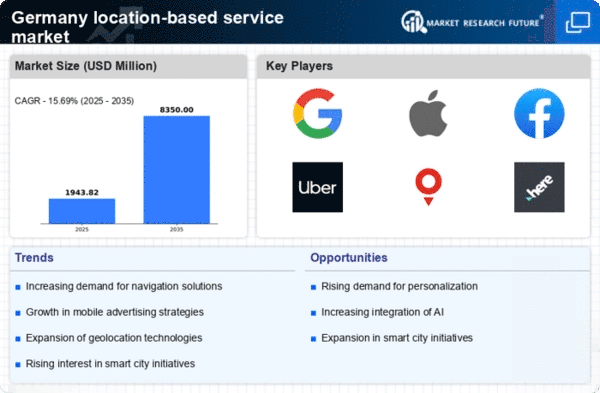Rising Demand for Real-Time Navigation
The location based-service market in Germany experiences a notable surge in demand for real-time navigation solutions. As urbanization accelerates, the need for efficient navigation systems becomes paramount. In 2025, approximately 70% of German consumers utilize navigation applications, reflecting a growing reliance on location-based services for daily commuting and travel. This trend is further fueled by the increasing integration of GPS technology in smartphones and vehicles. The location based-service market is likely to benefit from advancements in mapping technologies, which enhance user experience and accuracy. Moreover, the rise of electric vehicles and smart transportation systems may further drive the demand for real-time navigation, as users seek optimized routes and reduced travel times. Consequently, companies that innovate in this space may find substantial opportunities for growth and market penetration.
Expansion of Location-Based Advertising
The location based-service market in Germany is witnessing a significant expansion in location-based advertising. Businesses increasingly recognize the potential of targeted advertising strategies that leverage user location data. In 2025, it is estimated that location-based advertising will account for over 30% of total digital advertising spend in Germany, indicating a shift towards more personalized marketing approaches. This trend is driven by the proliferation of mobile devices and the growing sophistication of data analytics tools. As consumers become more receptive to personalized offers, businesses are likely to invest in location-based services to enhance customer engagement and drive sales. The location based-service market stands to gain from this trend, as companies develop innovative advertising solutions that utilize geolocation data to reach consumers at the right time and place.
Increased Focus on Sustainable Practices
The location based-service market in Germany is increasingly influenced by a focus on sustainable practices. As environmental concerns gain prominence, consumers are more inclined to support businesses that prioritize sustainability. In 2025, surveys indicate that over 60% of German consumers prefer companies that demonstrate eco-friendly practices. This trend is prompting businesses to adopt location-based services that promote sustainable options, such as eco-friendly transportation and energy-efficient routing. The location based-service market is likely to see growth in applications that help users make environmentally conscious choices, thereby aligning with consumer values. Companies that successfully integrate sustainability into their service offerings may enhance their brand reputation and attract a loyal customer base.
Growth of E-Commerce and Delivery Services
The location based-service market in Germany is significantly influenced by the growth of e-commerce and delivery services. As online shopping continues to gain traction, the demand for efficient delivery solutions has surged. In 2025, the e-commerce sector in Germany is projected to reach €100 billion, with a substantial portion of this growth attributed to the convenience of location-based delivery services. Consumers increasingly expect real-time tracking and updates on their orders, which necessitates the integration of location-based technologies. This trend presents opportunities for logistics companies to enhance their service offerings through improved route optimization and delivery tracking. The location based-service market is likely to see increased investment in technologies that facilitate seamless delivery experiences, thereby catering to the evolving expectations of consumers.
Advancements in Augmented Reality Applications
The location based-service market in Germany is poised for growth due to advancements in augmented reality (AR) applications. As AR technology matures, its integration with location-based services offers unique experiences for users. In 2025, the AR market in Germany is expected to reach €5 billion, with a significant portion driven by location-based applications. These applications can enhance tourism, retail, and entertainment sectors by providing interactive experiences that engage users in real-time. For instance, tourists can access AR-guided tours that overlay historical information on their surroundings. The location based-service market may benefit from collaborations between tech companies and local businesses to create innovative AR solutions that attract consumers and enhance their experiences.
















